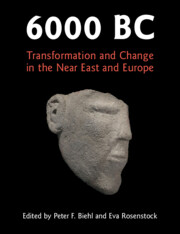Book contents
- 6000 BC
- 6000 BC
- Copyright page
- Contents
- Contributors
- Acknowledgments
- Introduction
- Part I Upper Mesopotamia and Eastern Mediterranean
- Part II Anatolia
- Chapter 6 A Conspectus on the Status of Tepecik-Çiftlik Excavation (Cappadocia)
- Chapter 7 The Downturn in Tepecik-Çiftlik’s Ceramic Production Continuity
- Chapter 8 Çatalhöyük East and Köşk Höyük
- Chapter 9 Abandoning Çatalhöyük
- Chapter 10 Çatalhöyük West and the Late Neolithic to Early Chalcolithic Transition in Central Anatolia
- Chapter 11 The Potter’s Riddle at Çatalhöyük
- Chapter 12 Pots for a New Millennium
- Part III Aegean and Marmara
- Part IV Southeast Europe
- Part V Modeling the Change
- Part VI Commentaries
- Index
- References
Chapter 6 - A Conspectus on the Status of Tepecik-Çiftlik Excavation (Cappadocia)
Intersite and Regional Outcomes and Prospects
from Part II - Anatolia
Published online by Cambridge University Press: 30 April 2022
- 6000 BC
- 6000 BC
- Copyright page
- Contents
- Contributors
- Acknowledgments
- Introduction
- Part I Upper Mesopotamia and Eastern Mediterranean
- Part II Anatolia
- Chapter 6 A Conspectus on the Status of Tepecik-Çiftlik Excavation (Cappadocia)
- Chapter 7 The Downturn in Tepecik-Çiftlik’s Ceramic Production Continuity
- Chapter 8 Çatalhöyük East and Köşk Höyük
- Chapter 9 Abandoning Çatalhöyük
- Chapter 10 Çatalhöyük West and the Late Neolithic to Early Chalcolithic Transition in Central Anatolia
- Chapter 11 The Potter’s Riddle at Çatalhöyük
- Chapter 12 Pots for a New Millennium
- Part III Aegean and Marmara
- Part IV Southeast Europe
- Part V Modeling the Change
- Part VI Commentaries
- Index
- References
Summary
Tepecik-Çiftlik, until now the only tell site excavated in volcanic Cappadocia, was occupied between the beginning of the 8th to the middle of 6th millennium and provides a profound amount of data for the Neolithic and early Chalcolithic periods. Rich and diverse environmental conditions allowed groups in this region to establish flourishing societies. Due to its location close to the Göllüdağ obsidian sources, the site seems to have played an important role in controlling the sources through production and exchange of raw materials and tools. These activities caused the appearance of extroverted and communicative societies, who had interests in and ties to distant territories, to “other worlds,” eventually culminating in a migration of parts of the society to territories situated in the north. To find out what was encouraging this migration, further research in volcanic Cappadocia will be crucial.
Keywords
- Type
- Chapter
- Information
- 6000 BCTransformation and Change in the Near East and Europe, pp. 83 - 103Publisher: Cambridge University PressPrint publication year: 2022
References
- 3
- Cited by

